14 September 2001: The lesson of history – Afghanistan always beats its invaders
Before the US invasion of Afghanistan, Robert Fisk wrote that George W Bush and Nato should heed his warning

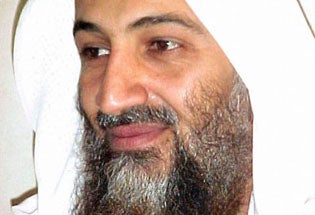
Your support helps us to tell the story
From reproductive rights to climate change to Big Tech, The Independent is on the ground when the story is developing. Whether it's investigating the financials of Elon Musk's pro-Trump PAC or producing our latest documentary, 'The A Word', which shines a light on the American women fighting for reproductive rights, we know how important it is to parse out the facts from the messaging.
At such a critical moment in US history, we need reporters on the ground. Your donation allows us to keep sending journalists to speak to both sides of the story.
The Independent is trusted by Americans across the entire political spectrum. And unlike many other quality news outlets, we choose not to lock Americans out of our reporting and analysis with paywalls. We believe quality journalism should be available to everyone, paid for by those who can afford it.
Your support makes all the difference.On the heights of the Kabul Gorge, they still find ancient belt buckles and corroded sword hilts. You can no longer read the insignia of the British regiments of the old East India Company, but their bones – those of all 16,000 of them – still lie somewhere amid the dark earth and scree of the most forbidding mountains in Afghanistan. Like the British who came later, and the Russians who were to arrive more than a century afterwards, General William Elphinstone’s campaign was surrounded with rhetoric and high principles and ended in disaster. George Bush Junior and Nato, please note.
Indeed, if there is one country – calling it a nation would be a misnomer – that the west should avoid militarily, it is the tribal land in which Osama Bin Laden maintains his obscure sanctuary. Just over two decades ago, I found out what it was like to be on an invasion army in that breathlessly beautiful, wild, proud plateau. Arrested by the Russian Parachute Regiment near the Salang Tunnel, I was sent with a Soviet convoy back to Kabul. We were ambushed, and out of the snowdrifts came the Afghans, carrying knives. An air strike and the arrival of Soviet Tadjik troops saved us. But the mighty Red Army had been humbled before men who could not write their own names and whose politics were so remote that a mujahid fighter would later insist to me that London was occupied by Russian troops.
Back in 1839 we British were also worried about the Russians. General Elphinstone lead an East India Company army of 16,500 – along with 38,000 followers – into Afghanistan, anxious to put an end to Dost Mohamed’s flirtation with the Tsar, took Kandahar and entered Kabul on 30 June with the first foreign force to occupy the city in modern times. Dost Mohamed – the British Superpower of the time knew how to deal with recalcitrant natives – was dispatched to exile in India, but the Afghans were not prepared to be placed under British tutelage. To garrison a foreign army in Kabul was folly, as Elphinstone must have realised when, on 1 November 1840, a British official, Alexander Burnes, was hacked to pieces by a mob in the souk and his head impaled on a stake. A 300-strong British unit in the field fled for its life back to Kabul. And when Dost Mohamed’s son turned up, leading an Afghan army of 30,000, Elphinstone was doomed.
He bartered his freedom in return for a safe passage back to the British fort in Jalalabad, close to the Indian frontier. It was one of the coldest winters on record and with few supplies, virtually no food and false promises of safety, he led his army – their columns 10 miles in length – out into the frozen desolation of the Kabul Gorge. The camp followers were left by the wayside; contemporary records describe Indian women attached to the British army’s colonial force, stripped naked, starving, raped and knifed by Afghan tribesmen, their corpses left in the snow. Elphinstone had long since given up trying to protect them. Yet each new foray down the chasm of the Kabul Gorge – I was to see the remains of a Russian convoy littered across the same track almost 140 years later – led to further ambushes and massacres.
Elphinstone secured the safety of himself, a few officers and a party of English ladies. The last British guardsmen were cut down on the heights, surrounded by thousands of Afghans, firing to the last round, the company commander dying with the Union flag wrapped around his waist. Days later, the last survivor of the massacres, galloping his exhausted horse Jalalabad was attacked by two Afghan cavalry. Hacking them away from him, he broke his sword, Hollywood-style, on one of the men. But with his horse dying beneath him, he reached the British fort. It was to date the greatest defeat of British arms in history.
The British clung to Afghanistan as if it was a jewel in the crown. Under the Treaty of Gandamak, the Amir Yakub Khan could rule Kabul and a British embassy would be opened in the city. But within months, in 1879, the residency was under siege, its few occupants fighting – once more – to the last man. With the embassy on fire, the handful of Britons inside made repeated forays into the ranks of the Afghans. “When charged,” a later British account would claim, “the Afghan soldiers ran like sheep before a wolf“. But within hours, the British were fighting from the burning roof of the residency, slashed to bits with swords, stripped and their bodies burned. The Consul, born to a French father and an Irish mother, was Major Sir Pierre Louis Napoleon Cavagnari, KCB, CSI. A British journalist with the Kabul Field Force found a few scorched bones in the residency yard; they included, no doubt, Sir Pierre’s remains.
Ironically, one of Elphinstone’s successors was visiting the site of the 1842 massacre in 1880 when he heard that his army – this was the Second Afghan War – had been attacked in a remote semi-desert called Maiwand where the 30th Bombay Infantry was fighting off thousands of ghazi warriors who were charging suicidally at British cannons and Egyptian colonial troops. Savage in their assaults, waving green Islamic banners and utterly heedless of their own lives – and the word “suicidal” is not used loosely here – they threw themselves among the British.
We were to conduct a military inquiry into the disaster that followed and now, in the fragile, yellowing pages of the Indian British Army’s Intelligence Branch report we can find chilling evidence of what this meant. Captain Wainwaring was to recall how “the whole of the ground to the left of the 30th Native Infantry, and between it and the Grenadiers, was covered with swarms of ghazis and bannermen. The ghazis were actually in the ranks of the Grenadiers, pulling the men out and hacking them down with their swords...” A young Afghan woman – all we know is that her name was Malaleh – feared that the tribesmen might withdraw and so tore off her veil, holding it above her head as a flag and charging at the Grenadiers herself. She was shot down by British rifle fire. But the British fled. In all, they lost 1,320 men including 21 officers, along with 1,000 rifles and at least 600 swords.
The Great Game was supposed to be about frontiers – about keeping a British-controlled Afghanistan between the Indian Empire and the Russian border – but it was a history of betrayals. Those we thought were on our side turned out to be against us. Until 1878, we had thought the Amir Sher Ali Khan of Kabul was our friend, ready to fight for the British Empire – just as a man called Osama bin Laden would later fight the Russians on “our” behalf – but he forbade passage to British troops and encouraged the robbery of British merchants.
He had “openly and assiduously endeavoured ... to stir up religious hatred against the English”, our declaration of war had announced on 21 November 1878. The Amir’s aiding and abetting of the murder of the British Embassy staff was “a treacherous and cowardly crime, which has brought indelible disgrace upon the Afghan people,” Sir Frederick Roberts announced in 1879 when, yet again, the British had occupied Kabul. The Amir’s followers “should not escape ... penalty and ... the punishment inflicted should be such as will be felt and remembered ... All persons convicted of bearing a part [in the murders] will be dealt with according to their deserts.” It was an ancient, Victorian warning, a ghostly preamble to the words we have been hearing from President Bush – and, indeed, Mr Blair – in the last 48 hours.
The Russians were to endure their 10 years of Calvary exactly a century later, though in truth it was the Afghans who suffered a virtual genocide under the Soviets. Osama bin Laden, who had himself escaped several murder attempts by Russian agents, survived. Perhaps Vladimir Putin who is being asked to subscribe to the west’s new battle for “democracy and liberty” against the forces of darkness might remind Mr Bush just how painful Russia’s military adventure in Afghanistan proved to be. Perhaps we could all go back to the history books before suggesting – and the idea of such an adventure is clearly being dreamed of in Washington – that the Great Game should be taken up once more.
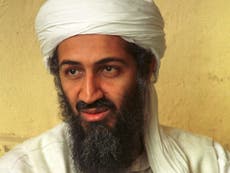
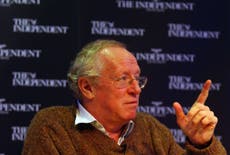
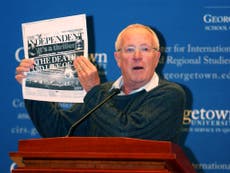
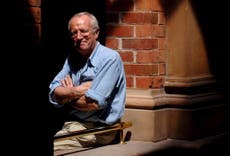
Join our commenting forum
Join thought-provoking conversations, follow other Independent readers and see their replies
Comments